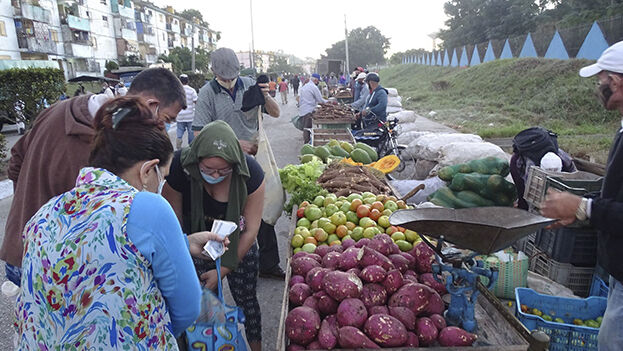
![]() 14ymedio, Havana, 7 March 2023 — Despite the failure of this type of measure in the past, Villa Clara will begin to control the prices of some agricultural products in the face of the “excessive and intolerable” rise of prices in the basic food basket. The resolution, issued by the Governing Council, establishes the maximum values for the wholesale and retail marketing of 20 high-demand foods, as of March 11.
14ymedio, Havana, 7 March 2023 — Despite the failure of this type of measure in the past, Villa Clara will begin to control the prices of some agricultural products in the face of the “excessive and intolerable” rise of prices in the basic food basket. The resolution, issued by the Governing Council, establishes the maximum values for the wholesale and retail marketing of 20 high-demand foods, as of March 11.
Alberto López Díaz, governor of Villa Clara, announced the measure as “our own war” against high food prices and assured that the “opinions” of individual producers and other productive forms of 13 municipalities were taken into account. The price cap will be flexible and periodic, according to the production of the agricultural harvests.
In the meeting with farmers, the official lashed out at vendors, whom he accused of “indisciplines, illegalities and high prices,” while pointing out that “it is preferable to lose some product rather than allow impunity for those who abuse the humble people and demoralize society.”
The rule includes malanga, banana and tobacco, sweet potato and cassava, while in the vegetable group there are squash, cabbage, cucumber, pepper and tomato. Among the grains are rice, black and red beans, dry and tender corn. The fixed prices also include papaya, guava and pineapple.
The decree establishes that the marketing margin of the twenty foods may not exceed 40% of the value paid to the producer. It also includes a “reorganization” in the sales network in areas that are “really needed” because, the provincial government argues, right now there is disorder, and “anyone can mount” an illegal business without a license and payment to the treasury.
Authorities say that a pound of rice — a food that has been scarce in most Cuban families — is sold in the province at 135 pesos ($5.70). With the new rule, the price to the commodity stockpiles will be 70 pesos ($2.92), the price in the wholesale market will be 84 pesos ($3.50) and for the retailer (final consumer) 90 pesos ($3.75).
A pound of black beans for the retail buyer will be set at 120 pesos ($5), a pound of red beans at 130 ($5.42), dried corn at 45 ($1.88), tomatoes at 42 ($1.75) and pepper at 55 ($2.29), for example.
Food sales will only be allowed with an authorization issued by the provincial delegate of Agriculture, which in turn will have to have the endorsement of the municipal authority and be “reconciled” with the president of the productive form to which the producer belongs.
The decree also includes other market surveillance measures, such as the creation of five engagement groups with territorial authority to reduce the risk of illegal food transfer to other provinces. Their powers will not replace the municipal structures, but they will monitor compliance with what was agreed by the Government Council.
Producers who sell above the set limits will be forced to market the merchandise at the price set by the decree, and if they re-offend, the decree warns, their marketing license will be withdrawn. Similarly, the new rule orders telephones and emails to be available for complaints from citizens about irregularities.
In 2021, the Cuban government failed with a similar experience in setting the prices of agricultural products. At the beginning of that year, the maximum prices for sales in the private sector were approved, but, in August, the authorities reversed because the measures were a brake on production since the producers could not recover the money they invested.
Translated by Regina Anavy
____________
COLLABORATE WITH OUR WORK: The 14ymedio team is committed to practicing serious journalism that reflects Cuba’s reality in all its depth. Thank you for joining us on this long journey. We invite you to continue supporting us by becoming a member of 14ymedio now. Together we can continue transforming journalism in Cuba.
